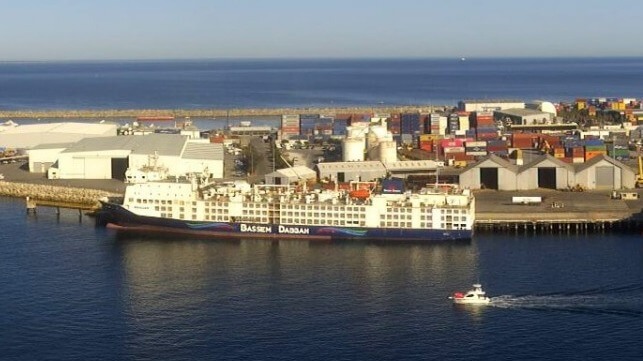Australia Relents and Docks Recalled Livestock Carrier During Heatwave

After nearly a month at sea, Australian authorities permitted a loaded livestock carrier to dock early on Thursday morning, February 1, in Fremantle, while they consider what to do with the 15,000 animals aboard. Animal rights activities are calling the entire situation “shocking,” and “inhumane” after the vessel departed bound for the Middle East but turned around due to the security problems in the Red Sea.
The Bahijah is loaded mostly with live sheep as well as a smaller portion of cattle. It departed Fremantle on January 5 reportedly heading to Jordan although media in Australia is saying the vessel is controlled by Israeli interests and was in fact going to Israel. Past voyages show it operating between Australia and Eilat, Israel. The ship which was built in 2010 is 7,900 dwt and 446 feet (136 meters) in length.
As the security situation in the area around Yemen deteriorated, the vessel was first stopped in the Indian Ocean with reports it would diver around Africa. It sat in the ocean “waiting for orders.”
Australia’s Department of Agriculture, Fisheries and Forestry after consulting with experts and the exporter decided to recall the vessel on January 20 due to uncertainty and for the safety of the animals. The Bahijah arrived off Fremantle on Sunday, January 28, and was expected to dock on January 29. Instead, the vessel was ordered to remain offshore while the authorities considered the biohazard after the animals had been out of the country for at least 25 days aboard the tight conditions aboard the vessel.
The exporter applied to the authorities to bring the vessel to the dock where they are proposing to offload a portion of the shipment. Those animals would be subjected to biosecurity controls to ensure they did not negatively impact livestock in the country. Animal rights groups have offered to care for the animals in quarantine.
The Department of Agriculture on Wednesday sent two independent veterinaries aboard the vessel to inspect the livestock and the facilities aboard the ship. The vessel is carrying a veterinarian who has been making daily reports to the authorities saying the animals remain in good health and “there is no evidence of any significant health, welfare, or environmental concerns.”
The exporter is proposing to restock the vessel with feed and supplies and sail with a smaller number of animals. The ship would take a projected 33-day route to reach the Middle East by going around Africa.
The Australian animal rights group Alliance for Animals issued a statement from its Policy Director Dr. Jed Goodfellow saying the entire plan is “alarming.” He is calling for “common sense and decency to prevail,” noting the animals have already been at sea for nearly a month and would be at sea for another month in poor conditions.
“The fact that the Department is even considering this application is shocking,” Dr. Goodefellow said. “It would be the height of recklessness to subject these animals to another grueling 33 days at sea under these circumstances.”
The Mayor of Fremantle was worrying about the conditions onboard and the impact it would have on the community. She warned of the “smell” after the animals had been at sea on the vessel for a month.
Animal rights groups are also highlighting that Australia, and specifically Fremantle, is in the worst heatwave it has experienced in more than two years. Temperatures have reached 105 F (41 C) and are expected to remain at these levels for four days.

that matters most
Get the latest maritime news delivered to your inbox daily.
The Agricultural Department confirmed in a statement midday on Thursday that the vessel had been permitted to dock and is currently is being replenished with supplies to ensure the ongoing health and welfare of the livestock. They denied "some public reports," saying no livestock are required to be offloaded for health reasons. However, they are still consulting with experts and working with the exporter to determine the next steps and "to reach a resolution as quickly as possible." No animals are currently being unloaded.
